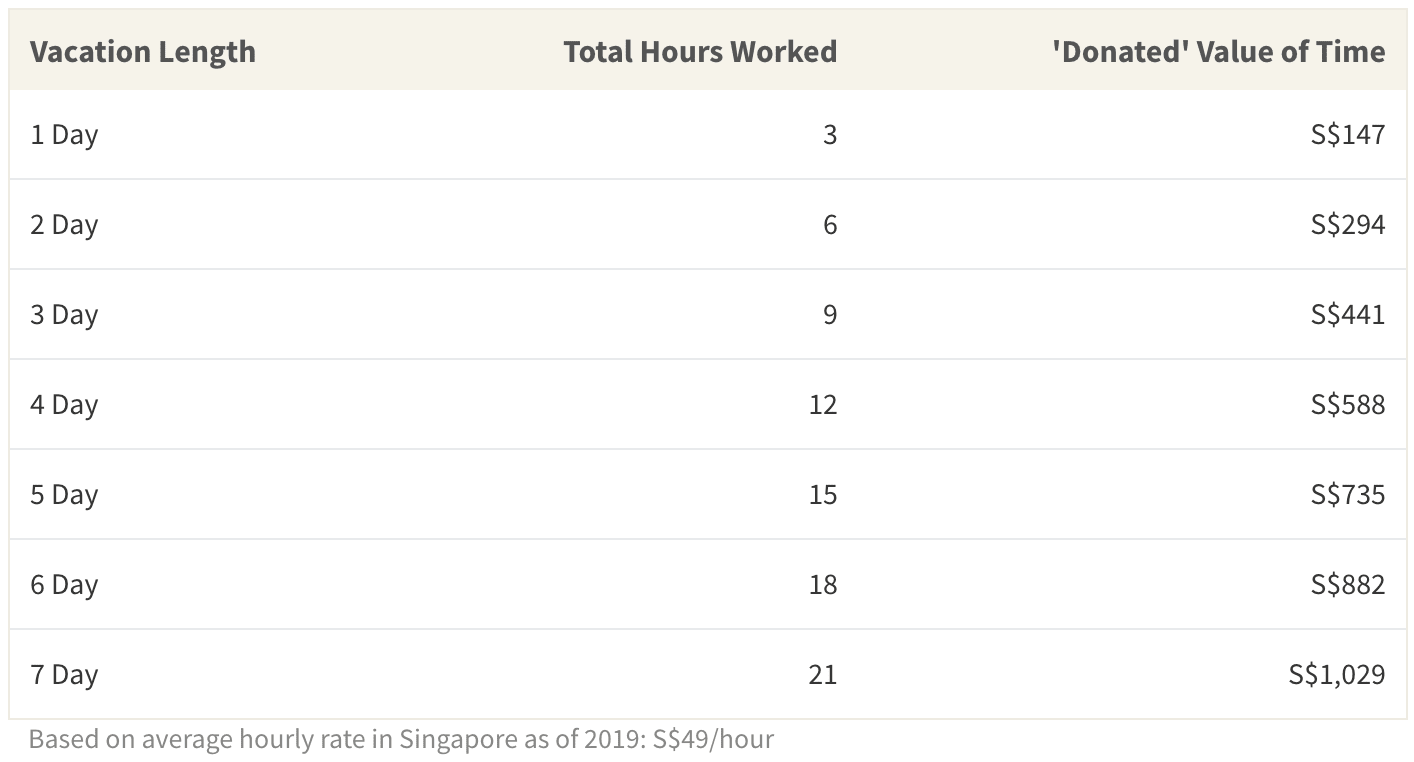Even with a guaranteed minimum of 7 days of paid annual leave, many Singaporeans are feeling overwhelmed by work. Coping with high expectations and a workaholic culture, about 200 workers lodge complaints with MOM each year regarding “excessive working hours.” Even more, about 36% of workers put “more holidays and annual leave” as their top priority at the workplace (excluding pay raises). Perhaps the biggest issue is that vacations aren’t being fully utilised–if you’re taking shorter breaks and bringing work along with you, you may actually be damaging your work performance in the long-run.
Working on Vacation is Working for Free–At Your Financial Loss
According to research by British Airways, 64% of Singaoreans said their longest holiday in 2017 lasted less than 10 days, and 48% cited concern over a piling workload as the top reason for limiting their trip length. Does this sound familiar? In workplaces around the world, taking time off is often associated with missing out or falling behind. In Singapore, however, this goes a step further. Another study found that 9 out of 10 Singaporeans say they’re unable to fully switch off from work, and 42% work through their holidays.
If you’re taking shorter vacations and bringing work along with you, your time off suddenly becomes just another workday, regardless of your location. In fact, by forfeiting your guaranteed leave, you’re volunteering to work for free. Even if you work just 2-3 hours per day on your vacation, you substantially diminish the value of the paid leave you received. At this rate, the average worker would ‘donate’ S$1,029 to their company across 7 days–that’s nearly equal to the average cost of a vacation (at S$1,264)!

Even so, the question remains, will the value of your donated time earn positive feedback? While many people think this extra work will actually boost their reputation and success, there are several reasons why giving up relaxation time can actually be quite detrimental.
Depriving Yourself of Relaxation is Costly to Health & Productivity
One of the primary reasons for taking paid time off is to allow for mental rest and relaxation, by whichever means best fits you. Forgoing this respite and splitting your attention can be extremely detrimental–both physically and in terms of work performance.
Overworked employees–who aren’t taking time to rest–are far more likely to experience a host of negative health effects. Associated stress and sleep deprivation increases the likelihood of incident strokes, cardiovascular disease, diabetes, anxiety, insomnia, obesity and more. Research has even found that people with longer working hours tend to have poorer mental health and increased depression symptoms.

In the same vein, working without taking time to relax can lead to mistakes on the job, disengagement, and higher burnout rates (which, unsurprisingly, is linked to sub-optimal job performance). Workplace stress has also been linked to diminished creativity and initiative, decreased patience, and problems with interpersonal relationships. Given that Singaporean hirers rank on-the-job-skills, leadership traits, and performance/attitude as the top 3 factors for promotion, it becomes pretty clear that the impact of overworking can damage your chances at success.
Taking Your Vacation Can Actually Help You Get Ahead
Moving beyond all this negativity, there’s a silver lining to consider–taking your vacation and ‘living in the moment’ can actually help you, even in the workplace. According to the research by Harvard Business Review, 94% of vacations have a good “ROI” on performance after returning to work, especially in terms of energy and outlook. Vacationers who focus on relaxation and detachment from work also tend to enjoy a boost in health and wellness after returning home. While co-workers stay behind to push through extra assignments, consider this–work intensity is actually a strong predictor of unfavourable outcomes. Take a break, enjoy your vacation, and come back far more refreshed than your peers.
Tips to Maximise Your Vacation Recharge
In order to be truly relaxing, vacations should be well-planned and stress-free. Here are a few ideas of how you can make your travels a bit more rewarding and carefree:
- Plan Your Trip Ahead of Time: If you already tend to booking flights, hotels, and activities ahead of time, great! If planning feels like a burden, however, consider these alternatives: group travel packages (notable for both convenience and affordability), volunteer travel (low fee, pre-planned), or a trip to an all-inclusive resort.
- Put Away Your Electronics: Checking your emails can be way too tempting if you keep your laptop and phone with you. Instead, consider keeping your electronics in your hotel room. You may even opt to stay somewhere without complimentary WiFi, reducing your incentive to constantly check in.
- Earn Rewards & Save on Your Vacation Spend: One of the biggest sources of vacation stress is often the cost. A few ways you can defray expenses are by checking to see if you already have free travel insurance through your credit card. Also check to see if your credit card offers any promotions with Agoda or Expedia–often you can access savings of up to 20% off hotels. And of course, use your credit card to book your flight. Whether you’re earning cashback or miles, it’s an easy way to gain rewards.
The article Why Working During Vacation Can Cost You a Promotion originally appeared on ValueChampion.
ValueChampion helps you find the most relevant information to optimise your personal finances. Like us on our Facebook page to keep up to date with our latest news and articles.
More From ValueChampion:
- Best Credit Cards with Promotions 2019
- Best Air Miles Credit Cards 2019
- Best Credit Cards for Overseas Spending 2019
Source: VP


